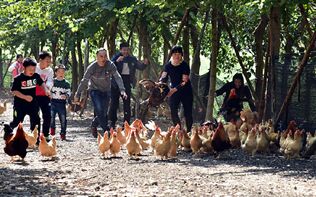众安保险计划用区块链技术颠覆鸡肉供应链
|
An insurance company in China is looking to shake up the country’s chicken supply chain — using blockchain technology. ZhongAn Online Property & Casualty Insurance, launched in 2014 with the backing of Alibaba payments affiliate Ant Financial, Tencent and Ping An Insurance, quickly grabbed attention with peculiar products such as a “binge drinking” policy that paid out if Chinese fans got drunk during football matches and suffered alcohol poisoning. The company’s assets have ballooned since, more than doubling in 2017 to Rmb21.2bn ($3.3bn), its annual report showed this week.
Last year the online-only insurer raised $1.5bn in a Hong Kong listing that was the world’s first “insurtech” public offering and attracted Japan’s SoftBank as a cornerstone investor. Insurtech companies try to use technologies such as artificial intelligence and blockchain to simplify insurance products and make them more accessible. Like many groups in China, ZhongAn has rapidly diversified away from its original business. One of its latest projects, GoGo Chicken, takes aim at China’s chicken supply chain — a trial run before ZhongAn eventually rolls out the technology to other applications. The company uses tracking devices and facial recognition technology to follow the movement of free-range chickens, from hatching to packaging, on hundreds of farms across China. Poultry are fitted with tracking devices on their legs and the data are logged using a blockchain ledger — an unalterable record that underlies cryptocurrencies such as bitcoin. Customers can download an application on to their smartphones that allows them to track a chicken’s route to the supermarket, and provides access to the bird’s life history along with charts showing its level of activity. Using an incorruptible blockchain record to track the origin of food in China could help address some of the country’s perennial food safety problems, said Francis Tang, ZhongAn’s chief financial officer. China has been repeatedly rocked by scandals in which dangerous food products have made it on to supermarket shelves. “They [the farmers] want to sell these free-range chickens at a higher price but a lot of people don’t know if this is really a free-range chicken,” Mr Tang said. ZhongAn’s technology, said Mr Tang, “shows you exactly where it [a chicken] has been” and whether hormones or other harmful elements have been introduced along the way. The company’s foray into China’s food supply chain underlines the nature of ZhongAn: it has always considered itself a tech company first and insurance group second. Analysts have expressed scepticism about ZhongAn’s insurance business. The company this week posted a net loss of about Rmb1bn for 2017, which management blamed on regulations requiring it to set aside reserves for a growing pool of longer-term products. The company sold 5.3bn policies last year to 432m customers, roughly a third of China’s population, solely via online distribution — an unheard of achievement for a traditional insurer. But to distribute its products the company is highly reliant on partnerships with other online companies, whose fees have eroded the thin margins on ZhongAn’s low-cost policies ZhongAn was also forced last year to refund about Rmb500m in investment products, Mr Tang disclosed, after Chinese regulators banned them as part of a crackdown last year on short-maturity, high-yield wealth management products. |









